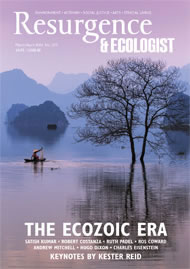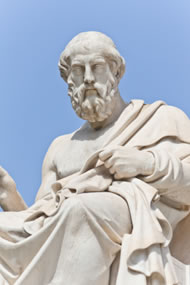Many years ago, at the time when the Green movement first emerged as an organised political force, calling itself the Ecology Party, a book was published by the distinguished Iranian philosopher Seyyed Hossein Nasr entitled Man and Nature: The Spiritual Crisis of Modern Man. In it, Nasr warned his readers: “The ecological crisis is only an externalization of an inner malaise and cannot be solved without a spiritual rebirth of Western man.”
At the time, this was not a perspective that many activists were prepared to take on board, and this remains the case today. Nasr, though, understood that if the ecological crisis is of our own making, then clearly we need to see what it is in ourselves that has brought it about. This is not instead of taking much-needed actions, but rather as a precondition to ensure the actions that we take are wise ones.
One reason why it can seem to be a luxury to address the question of our own collective “inner malaise” is that we are still under the thrall of the Cartesian worldview, in which what is out there in the world is seen as having no connection with what occurs in our inner life. Nature has been relegated to the background of our all too absorbing human dramas, and many struggle to feel a genuine link between what takes place within the human sphere and what is occurring in the natural world. This feeling of human separation from Nature belies the fact that the condition of the natural environment indubitably reflects our collective values, and indeed our underlying worldview.
The prevailing worldview of the West was defined in the 16th and 17th centuries by such thinkers as Galileo, Bacon and Descartes, who inaugurated the scientific revolution. Displacing the older, traditional reverence for Nature as a manifestation of the divine, the new scientific method prioritised mathematically precise quantitative thinking over the older qualitative approach to understanding and relating to the natural world.
Spiritual intuition and a feeling of empathy for Nature – which had underpinned the older sensibility – had no place in the conduct of the new science. From its inception, the new science allied itself to a technological view of Nature as a resource to control and exploit as efficiently as possible, cutting itself loose from the older, reverential view of Nature as a living organism imbued with spirit. This meant that a large part of what lived in the human being was denied legitimacy as providing a valid way of knowing and relating to Nature.
It is for this reason that the current plight of ecosystems needs to be seen as reflecting back to us a fatally reduced conception not only of the world but also of the human being. We have been able to wreak ecological devastation on the planet not just because we have adopted a highly partial, one-sided view of the world but also because we have succumbed to a drastically diminished view of what it means to be human.
Since many of us have been persuaded to reconceive ourselves as no more than biological computers, those aspects of human nature that were once regarded as essential – such as our ability to think morally, creatively and imaginatively – are now seen as increasingly marginal to finding solutions to the problems that we face. With the soul so besieged, the spirit denied and the ground of human decision-making thoroughly permeated by computer-compatible rationality, we are in danger of becoming strangers to truly human values, insight and wisdom. More computing power and more technological interventions seem to be the answer rather than the one thing that is actually needed, which is a change of heart.
It may therefore be timely for us to revisit the philosophical, religious and visionary tradition that was swept aside by those thinkers who ushered in the scientific revolution. There is a stream of wisdom that goes back at least as far as Plato and Plotinus, and that was also expressed in the visionary poetry of Dante and in the mystical writings of Meister Eckhart, to name but a few, and which is often referred to as the perennial philosophy, or philosophia perennis. In it we find a view of Nature as a manifestation of spirit, and a view of human interiority as opening towards the divine.
In this wisdom tradition, the interiority of Nature and the interiority of the human being ultimately coincide, for the originating source of both is the one universal spirit manifest throughout creation. Within this tradition reverent contemplation of Nature makes complete sense, while to persist in treating Nature merely as a resource to be exploited, controlled and manipulated is actually to undermine what is most precious within the human being.
To reacquaint ourselves with this tradition does not mean that we should attempt to put the clock back, but rather that we should reconnect with our cultural and spiritual roots. Instead of prioritising financial gain and technological might, the perennial philosophy emphasises ideals such as beauty, truth and goodness as the basis for wise decision-making.
There is a dangerous hubris in continuing to think we can eventually solve our ecological problems by simply increasing the computational and technological power we throw at them, while at the same time dismissing with condescension our own spiritual heritage. Of course the perennial wisdom is not a panacea for the enormous challenges we face, but it does offer guidance as to how we might find a different orientation to these challenges, and a grounding in values and ideals that promote rather than subvert what is truest and best in the human being.








